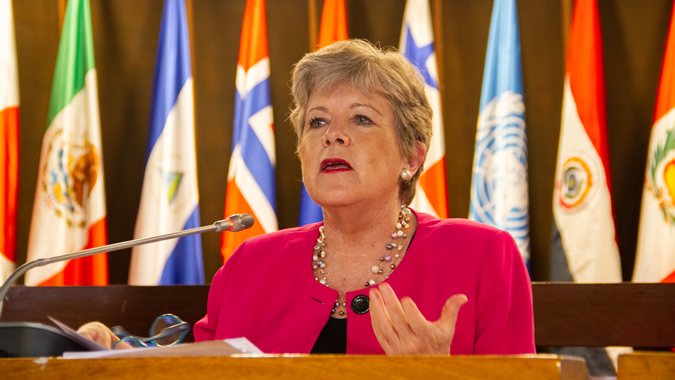Gender Equality is a Key Factor for Sustainable, Inclusive and Equitable Growth: Alicia Bárcena
Work area(s)
“The future post COVID-19 needs women,” ECLAC’s Executive Secretary stressed during a virtual seminar organized by UN Women on domestic violence in the context of the current crisis.

“Gender equality is a key factor for sustainable, inclusive and equitable growth. The future post COVID-19 needs women,” Alicia Bárcena, Executive Secretary of the Economic Commission for Latin America and the Caribbean (ECLAC), underscored this Thursday, April 30, during a webinar organized by the United Nations Entity for Gender Equality and the Empowerment of Women (UN Women).
The virtual seminar was entitled “Domestic Violence: What companies can do to combat increased violence in this context of crisis.” It is one in a series of gatherings held as part of the “Win-Win: Gender Equality is Good Business” program, begun in 2018 by UN Women in collaboration with the International Labor Organization (ILO) and with funding from the European Union.
The event’s participants included Alicia Bárcena, ECLAC’s Executive Secretary; Carolina Cuevas, the Women and Gender Equity acting Minister of Chile; María-Noel Vaeza, UN Women’s Regional Director for Latin America and the Caribbean; Stella Zervoudaki, Ambassador of the European Union Delegation in Chile; Constanza Borquez, Head of Corporate Social Responsibility at AVON; Sol del Cabo, Human Resources Manager at Natura; and Andrea Gualde, Director of Legal and Institutional Affairs at Farmacity.
In her presentation, Alicia Bárcena stressed the importance of encouraging women’s leadership in these times of crisis. “With the opening up of confinements that is taking place, I think we have to prepare ourselves more than ever to ensure there are no rollbacks in women’s economic autonomy and their leadership within companies, and to be able to promote gender equality, advance the presence of women in decision-making, for striking a balance between work and care work, safeguarding their salaries, and of course upholding standards of inclusive communication,” she indicated.
Bárcena recalled that COVID-19 will cause the deepest recession in the region since 1914 and 1930, with a -5.3% drop in regional GDP this year, which will have a sharp impact on unemployment along with effects on poverty and inequality. “We have estimated that unemployment could rise by 12 million people and that 107 million women in the region may find themselves in situations of poverty,” she stated.
“Violence against women is intensifying greatly at this time. That is why it is very important to map government initiatives on gender matters during the crisis. To that end, we have created the COVID-19 Observatory in Latin America and the Caribbean to compile and disseminate the public policies that the 33 countries of the Latin American and Caribbean region are implementing. I invite companies to help us include the measures they are taking as well,” she said.
According to ECLAC’s Executive Secretary, policy measures must be focused on five key thematic areas for women’s autonomy and gender equality: prevention, assistance and responses in the face of violence against women in the context of confinement; domestic and care work in the home in contexts of confinement; protection of women’s jobs and income; benefits, cash transfers and other social protection measures for women in diverse circumstances; and women’s participation through digital media and as key actors for containing the pandemic.
She added that special measures must be taken for health sector workers in the region, since more than 70% of them are women. “We have insisted on the importance of breaking the statistical silence with regard to women, with initiatives like ECLAC’s Gender Equality Observatory. There we have recorded, for example, that in the last 12 months, 1 out of every 3 women had suffered emotional, patrimonial, physical or psychological violence perpetrated by their intimate partners. In addition, as of December 2018, at least 3,800 women had been killed in femicides,” she explained.
Bárcena insisted that new protocols should be designed to ensure women have lives free from violence. In this area, she highlighted Chile’s Contingency Plan – which addresses the prevention, assistance and protection of women who are victims or possible victims of violence during confinement – along with Paraguay’s protocol for prevention and assistance to female victims/survivors of violence in light of the COVID-19 emergency. She also pointed up a decree to guarantee the uninterrupted provision of services by family police units in the framework of the national emergency declared in Colombia, and the distinct protocols and guidelines for action defined by Public Prosecutor’s Offices, in the case of Argentina and Peru.
“We can see concrete action in countries. Governments are aware of the need to protect women, their jobs and their income, above all in times of confinement. I think we are making progress. However, the realm of small and medium-sized enterprises (SMEs) is perhaps where the biggest challenge lies, and where we will have to take action,” she noted.
“When the economy slumps, which is what is happening today, and demand is not being generated by production activity, without a doubt the State’s job is to boost demand. That is very important,” the Commission’s highest authority emphasized.
“Today more than ever, gender equality in companies is a key factor for confronting this crisis,” she added.
Type
Country(ies)
-
Chile
- Latin America and the Caribbean
Related link(s)
Contact
Public Information Unit
- prensa@cepal.org
- (56 2) 2210 2040
